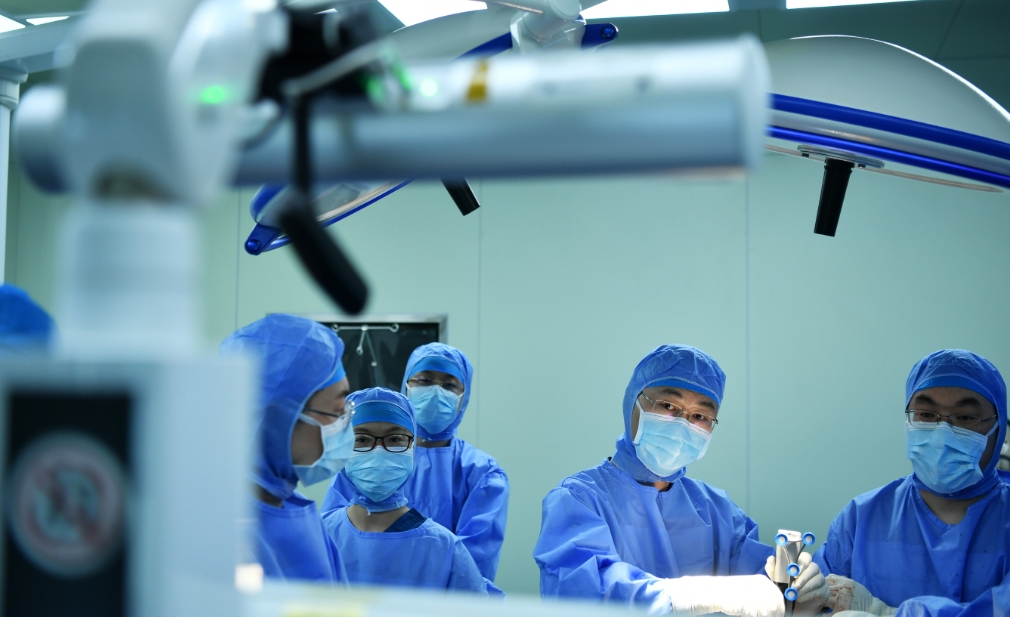The recent pig-to-human kidney transplant in China offers hope to millions of patients in organ crisis.
A Chinese medical team has successfully transplanted a gene-engineered pig kidney into a uremic patient recently, marking a major clinical milestone in cross-species organ transplantation.
World’s Fifth and Asia’s First Surgery of Its Kind
The medical team from Xijing Hospital of the Air Force Medical University transplanted a gene-edited pig kidney into a 69-year-old woman with end-stage kidney disease on Mar 6. After blood flow was restored, the transplanted kidney turned pink and soon began producing urine.
On the sixth day post-operation, the patient was stable with good kidney function, and her 24-hour urine output peaked at 5,468 milliliters. Her serum creatinine level, a key biochemical indicator for assessing kidney function, dropped to normal by day three, indicating initial surgical success, according to the team.
The patient will face challenges like immune rejection, coagulation disorders and pathogen-caused infections in the coming days.
The surgery marks the world’s fifth such procedure and Asia’s first. It is also another clinical breakthrough for Xijing Hospital, which performed the world’s first successful gene-edited pig-to-brain-dead recipient xenogeneic orthotropic whole liver transplant on Jan 7.
Patient and Family Suffered for Years
The patient is a 69-year-old woman who has battled severe high blood pressure, diabetes and other chronic conditions for more than 30 years. Diagnosed with end-stage renal failure eight years ago, her only options were dialysis or a kidney transplant.
Due to her high sensitivity to human donor antigens, no compatible human kidney was available, leaving her reliant on thrice-weekly dialysis. Her condition worsened after a stroke three years ago and a subsequent heart attack.
Despite these challenges, her son, persisted in caring for her. Balancing day and nighttime work, he carried his mother up and down the stairs of their four-story apartment building each day for eight years.
After learning of Xijing Hospital’s xenotransplantation research, they decided to pursue the experimental procedure.
“Someone had to take the first step to the moon. Our leap of faith is to test this possibility and bring hope to others,” her son said, “The medical team’s round-the-clock care has given us great confidence and courage. We hope this research paves a path for others.”
A Key Focus in Biotechnology
At least four live pig-to-human kidney transplants have been reported to date, all in the United States. The patient who underwent the transplant last November is the longest-surviving recipient of a pig organ so far, while the fourth patient, transplanted in January this year, has survived for over a month.
Last year, Chinese scientists transplanted a gene-modified pig kidney into a macaque, and reported in December to have achieved organ function for more than six months, a benchmark for long-term survival.
Gene-editing pigs to provide organs to humans for performing xenotransplantation remains a key focus area in advanced biotechnology.
The researchers from Xijing Hospital performed the first-ever transplantation of a gene-modified pig liver into a brain-dead patient last April. A month later, a team from the First Affiliated Hospital of Anhui Medical University transplanted a gene-modified pig liver into a living human patient with severe liver cancer.
“Xenotransplantation could be a key way to solve the organ shortage problem and offer new hope for many patients,” said Dou Kefeng, who led the Xijing hospital team.
Written by Sha Liu, additional reporting from China Daily, CGTN, Xinhua.
If you liked this article why not read: Better Diet, Healthier Life: China Unveils Guideline to Improve Nutrition Quality











